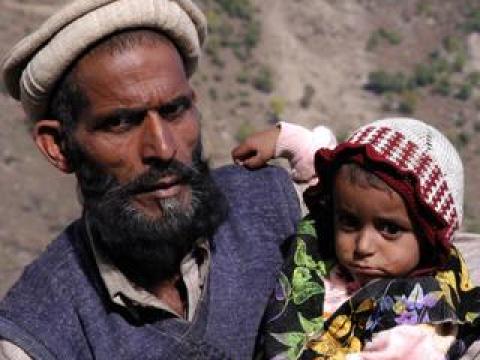Quake mother’s grief knows no bounds

In a matter of seconds the South Asia earthquake erased all the love and laughter from the household of Subba and Rashim Jan Mughal’s 16-member family. Rashim Jan and another daughter in law are the only women among the family’s 10 survivors now.
Rashim Jan has no energy even for the critical tasks of preparing shelter against the snows due in two weeks. She simply sits in the sun, the ruins of her sprawling home at her right and a makeshift shelter constructed from its remains, at her left. The men respectfully work around her.
Rashim Jan has no energy even for the critical tasks of preparing shelter against the snows due in two weeks We feel fortunate to communicate with her as she speaks from behind her black purdah. People on these mountaintops are very traditional and women live much of their lives out of sight. There are lines not to be crossed even though we have been afforded this audience. Subba will not allow his wife to be photographed.
When the family home collapsed the morning of 8 October two of Rashim Jan’s daughters, her two daughters in law and two grandchildren were buried alive in one room. They were dead by the time the men could dig them out.
One daughter in law was breast-feeding her 18-month-old son while her 3-year-old daughter laughed at her side. The other daughter in law was knitting and two of Rashim Jan’s daughters, 12 and 15, were sitting with the older women.
What can I say? They were given by my God and He has taken them back... As she describes the scene, the ghostly laughter of girls and women rings in your ears and you see Pakistani women talking over family matters; the older one caring for her children, the younger dreaming of the children God would soon give her and two teen girls basking in the company of their role models.
Rashim Jan’s instincts were those of any mother. When she saw the house fall she dashed to rescue her beloved family. She found herself buried up to her nose in earth and debris. Her husband and sons dug her out along with another son who also rushed to help. He wasn’t breathing when they found him but started soon after.
“What can I say? They were given by my God and He has taken them back. He has put me out of my house, taken each and everything from us. I have nothing left. I miss my two daughters. They gave me so much love,” said Rashim Jan.
We didn’t eat for three days but she took no water or food even after that. We forced her to eat There are moments when this woman adjusts her black purdah and we see a face, which visibly aches over this loss. She speaks without prodding about her attempts to make sense of the tragedy. That is when the listener aches.
“We believe it was all done by God, that it was written in His book. He was trying to steer us from the wrong way. There isn’t much sin here but we have been backbiting. There is jealousy, one person coveting another’s nice house. He has given us another chance,” she said.
Subba, her husband, described the extent of her grief: “I was afraid my wife was going to die. We didn’t eat for three days but she took no water or food even after that. We forced her to eat.”
Subba and his family lived in a sprawling house of earth, timber and corrugated roofing on a mountainside overlooking a stunning view of the steep slopes above the Bhugarmong Valley.
Their abode now is corrugated iron salvaged from the roof and propped against timbers. More large pieces of wood weigh down the iron sheets. The shelter is low and small for 10 people.
The smell of four rotting cows buried under more earth and debris is the ever-present reminder of the tragedy that will scar this family for all their days.
The smell of four rotting cows buried under more earth and debris is the ever-present reminder of the tragedy Rashim Jan will need to find her will to live again and begin living not only for herself but for the eight men in her family. With so few women left, the men will be lost. In this deeply traditional family environment women are the silent base, the glue that holds the family together.
The family is part of the village of Kalama, which sits at 1,911 meters (6,270 feet). World Vision staff walked here on Monday, 17 October with 40 local men who hauled 840 blankets and eight tents up 60-degree slopes.
The men had little to eat for days because the quake destroyed their food stocks but they still refused to eat, preferring to observe the Muslim daytime fast of Ramadan. The bales of 30 blankets each weighed 35 kilos (77 pounds).
-Ends-